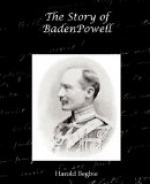[Illustration: “Viret in AEternum”
Van der Weyde, Photographer,
182, Regent St., W.]
Baden-Powell was as assiduous in his attentions to his men as any knight to his lady. He wooed them and won them. He did not win by playing to the gallery, asking if they were quite comfortable in their room, and giving them little coddling presents. He won as a man wins a love that is worth winning, by treating the object of his devotion with respect and perfect trust. His work at Malta, when he was acting as Assistant Military Secretary to the Governor, secured for him the affection of hundreds of soldiers and, I am glad to add, sailors too. He was the life and soul of the place, indefatigable in getting up sports and theatricals for the men, and building a permanent club for their use, which effectually prevented the weaker men, or shall we say the more generous hearted? from spending too much money in public-houses. It was a sight to see the gymnasium, in which the theatricals were held, during one of Baden-Powell’s performances. The vast floor of the building was crowded with soldiers packed as tightly as sardines, and the rafters running from wall to wall were all bestridden by sailors as happy and as comfortable there as the Governor and his party sitting in the front row in their splendid chairs from the palace. And when B.-P. appeared in the wings a shout such as might have brought down the walls of Jericho shook the great building, and soldier and sailor vied with each other to see who could keep that roar of welcome going the longest. And over and over again did Baden-Powell apply for leave to shirk some great social function in the palace because the hour of such entertainment clashed with the time he spent among Tommy and Jack in the gymnasium or the club.
His opinion of the soldier is a high one, and that is the secret of his success. He loves to recount instances which have come in his long experience, showing the soldier in the best light, revealing his pluck, his love of little children, his chivalrous championing of the weak, his handiness, his humour, his cheerfulness in depressing circumstances, his self-respect, and his honesty. What was it that struck his attention most about the tempting work of searching Prempeh’s palace for treasure? That the work which was entrusted to a company of British soldiers “was done most honestly and well, without a single case of looting. Here was a man with an armful of gold-hilted swords, there one with a box full of gold trinkets and rings, another with a spirit-case full of bottles of brandy, yet in no instance was there any attempt at looting.” And, eating out his own heart, on that bitter march back from Kumassi to Cape Coast Castle, he had eyes for the splendid doggedness of the British soldier: “In truth, that march down was in its way as fine an exhibition of British stamina and pluck as any that has been seen of late years. For the casual reader in England this is difficult to realise,




